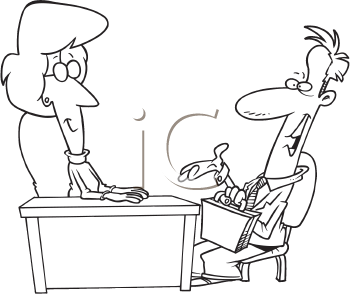This past weekend, I went to the theaters and saw the big blockbuster Transformers: Dark of the Moon. One part that got me thinking (not a major spoiler alert) was when Sam, a character from the movie, had to interview for jobs. He graduated from college and has no job, and his dad makes fun of him while chauffeuring him to job interviews all around the city. Each boss asks Sam different questions, and he answers them in a way that is opposite what the employer is looking for. It got me thinking about my interview experiences and what I have learned thus far. So, I thought I would share with you some advice I have about interviewing for a job or internship.

Interviews occur for employers to evaluate potential employees for prospective employment. Each company may have a slightly different way of conducting interviews. The basics of each interview consist of introductions, going over your resume and questions, and then questions that you may have.
So, the first thing is to prepare. A few days before your interview, conduct some research. Find out as much as you can about the company, who will be interviewing you and the position to which you’re applying. Next, prepare questions to ask the interviewer. At the end of the interview, you will be provided the time to ask questions and companies love it when the candidate has relevant, thoughtful questions to ask. If they ask you if you have any questions and you say “no,” it usually is taken as a sign that you don’t really care all that much about the company. The most important question of the interview may be the one you ask.
Brainstorm several past experiences that will show how you have succeeded in jobs, how you have solved problems, and what your strengths and weaknesses are. Below is a list of popular questions that interviewers like to ask:
- Give me an example of a time when you had to be quick in coming to a decision.
- Have you ever had difficulty getting others to accept your ideas? What was your approach? Did it work?
- Give me an example of a time when you went above-and-beyond the call of duty.
- Describe a recent unpopular decision you made and what the result was.
- How do you decide what gets top priority when scheduling your time?
- Tell me about a time when your boss asked you to do something you didn’t think was appropriate. How did you respond?
- What do you like to do at work, dislike doing, and why?
- Tell me about a time when developing good working relationships in your own work group was critical for success.
After all the prep work, it will be time for the interview. Unless stated otherwise, business professional is usually the best way to dress for an interview. “Dress to impress” may seem silly, but it’s so true. Have a portfolio and paper to take notes while being interviewed. (This can also hold your resume, if they ask for another copy.) Make sure to introduce yourself, shake hands, and maintain good eye contact. Remember to use examples that fit the questions they ask and to ask good questions because you’re interviewing the company as well. At the end of your meeting, thank them for their time and for the interview. You may even consider sending a follow-up email, handwritten thank you note or both.
Your resume is what gets you in the door for the interview; the interview is what lands you the job or internship. There are many quotes and talks about first impressions, but the truth is that the first interview is what distinguishes you from the rest of the crowd. Make sure you are ready to make yourself stand out so that when the interviewer looks at all the candidates, they remember something about you.
What do you want the interviewer to remember about you? How can you better prepare for an interview?
